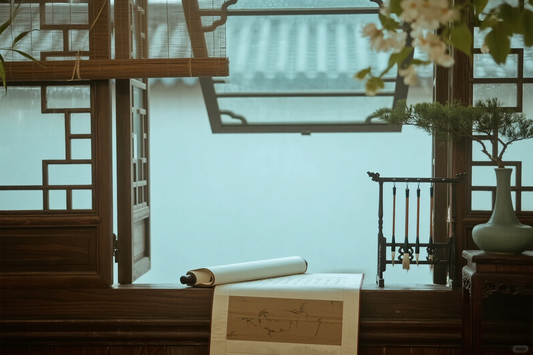
Introduction: When the Clouds Rise, Let Them
“When I reach the end of the water’s path, I sit and watch the clouds rise.”
— Wang Wei
This quiet line from the Tang dynasty poet Wang Wei offers a moment of pause—a reminder that life, in its deepest truth, is not always about striving, fixing, or hurrying. Sometimes, the most profound wisdom lies in simply being still enough to watch the clouds drift into view.
In the rich tradition of Chinese classical poetry, particularly from the Tang and Song dynasties, we find not only aesthetic brilliance, but a whole way of seeing the world—a philosophy rooted in rhythm, nature, and the intimate inner life. These poems speak not only of landscapes and longing, but of how to cultivate clarity, emotional depth, and mindful presence in the flow of ordinary days.
In this blog, we explore how poetry—especially Tang and Song verse—can guide us back to a poetic way of living, one shaped not by consumption and speed, but by quiet observation and inner richness.
I. Poetry as Inner Landscape: The Art of Gentle Perception
In classical Chinese culture, poetry was never merely literature—it was a form of self-cultivation. To write, read, or recite a poem was to attune the mind to beauty, balance, and subtle truth. Every detail—a falling leaf, a distant flute, a full moon—became a doorway to reflection.
For example:
“The moonlight before my bed—
I suspect it's frost on the floor.
I raise my head to look at the bright moon,
Then lower it and think of home.”
— Li Bai
This simple image speaks of homesickness, stillness, and longing without sentimentality. It invites us to:
-
See the world not just through the eyes, but through feeling
-
Let ordinary sights awaken memory and meaning
-
Embrace stillness as a space of emotional awareness
II. The Aesthetic of Slowness: Beauty Found in Pausing
Unlike modern content designed to “grab attention,” classical poetry invites the opposite: slowness, silence, and savoring. Reading a single couplet can be like walking through mist—its full meaning arrives not instantly, but gently.
Take this example:
“Drinking alone under the moon, I raise a cup to the sky.
The moon, my shadow, and I make three.”
— Li Bai
What appears playful also speaks to solitude, self-awareness, and freedom. The poet is not lonely—he is deeply connected to the rhythm of the cosmos.
In modern life, we often fear quiet. But in Tang poetry, quiet is where everything begins:
-
Emotional clarity
-
Creative inspiration
-
Spiritual depth
To live poetically is to pause long enough to feel what’s underneath the noise.

III. Emotions, Refined: Expression Without Excess
Chinese classical poets had a gift for expressing vast emotion with minimal words. Instead of drama, they offered distilled emotion—longing, grief, joy, hope—wrapped in the subtlety of metaphor.
“The falling blossom knows no words,
Yet its fragrance fills the garden.”
— Anonymous, Song Dynasty
Here, emotion is not explained—it is felt. The falling blossom suggests loss, but the fragrance affirms memory, legacy, and quiet beauty.
This poetic restraint reflects an emotional intelligence that modern life desperately needs:
-
Feel deeply, but don’t be consumed
-
Express sincerely, but not loudly
-
Remember beauty, even in sorrow
IV. Nature as Mirror: The Dao of Everyday Life
For many Tang and Song poets, nature was not background—it was the primary teacher. Mountains, rivers, plum blossoms, bamboo—all carried symbolic meaning and personal wisdom.
“A single crane flies through the snow,
The sky is pure, the trees are still.”
— Meng Haoran
This isn’t just description. It’s a mirror for the soul: simplicity, purity, presence.
In Southeast Asia, where nature plays an integral role in daily life—whether through monsoons, rice fields, or tropical flora—this poetic awareness of the environment finds deep resonance.
To live poetically is to:
-
Notice the rhythm of the rain
-
Admire the curve of a banana leaf
-
Listen to birdsong as if it’s saying something just for you

V. Ritual and Renewal: Bringing Poetry into Daily Life
Incorporating poetic living into the modern day doesn’t require classical training—it asks only for attentiveness and intention.
Here are small rituals inspired by Tang/Song poetic values:
-
Begin the morning with one quiet verse
-
Brew tea without distraction, just listening to the steam
-
Write a haiku or reflection at dusk
-
Observe the moon as a meditation on change
These simple acts return the soul to the moment, transforming routine into reflection.
Conclusion: To Live Slowly Is to Live Fully
“When I reach the end of the water’s path, I sit and watch the clouds rise.”
— Wang Wei
In this line, there is no goal, no urgency, no conclusion. There is only presence, and in presence, peace.
A poetic life does not mean living in seclusion or reciting ancient verse—it means living with depth, with attention, with reverence for the ordinary. In a time of speed and spectacle, poetry offers a form of quiet resistance—a return to self, beauty, and being.
Let your life include:
-
Still mornings
-
Beautiful sentences
-
Quiet meals
-
Walks without phones
-
Conversations that don’t solve, but simply witness
Because in the space between words and the silence between clouds,
you may remember who you are.




